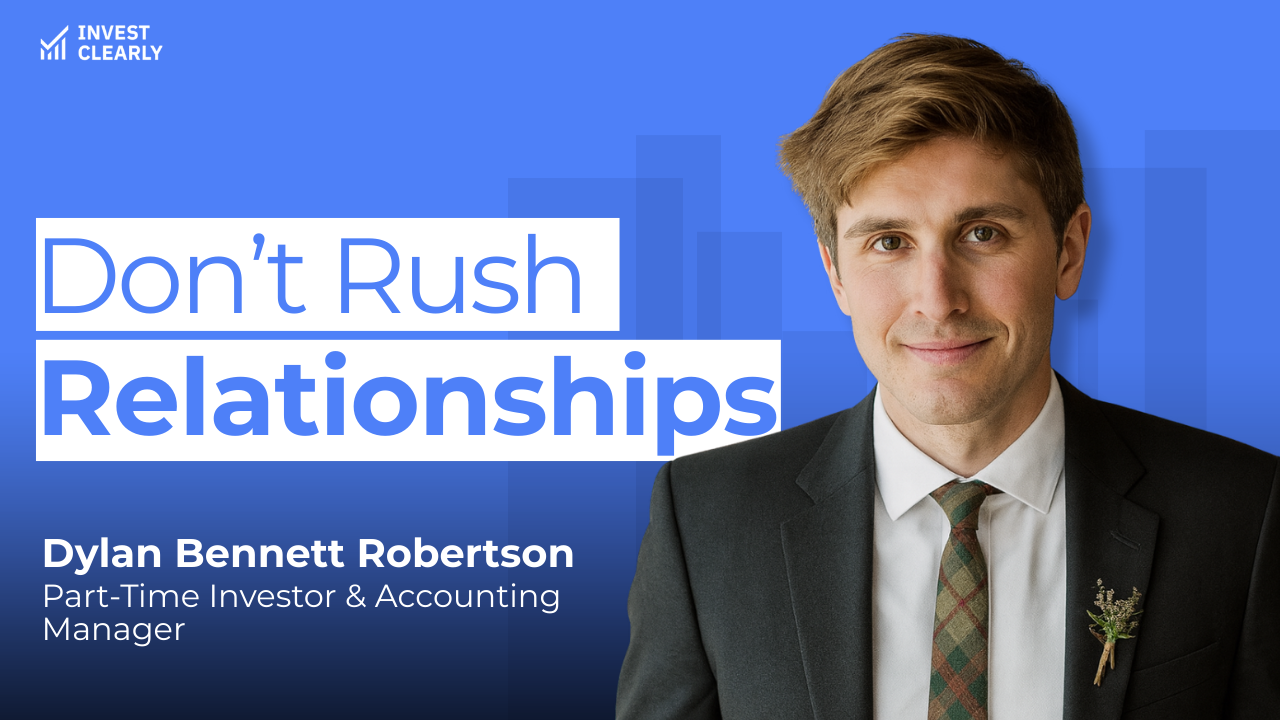
“There is Wisdom in Fear”: Dylan's Investment Story
Never miss an Invest Clearly Insights article
Subscribe to our newsletter today
In this conversation, Dylan shares his journey as an investor, discussing his background, portfolio, and the lessons learned along the way. He emphasizes the importance of building relationships, evaluating sponsors, and conducting thorough due diligence. Dylan also challenges the notion of passive investing, advocating for active engagement and responsibility in investment decisions. The discussion highlights the significance of community and networking in the investment space.
“There is Wisdom in Fear”: Dylan's Investment Story
[00:00:00] Dylan: In order for it to be passive for someone, it has to be active for someone else. There's always another deal. You have to be willing to walk away, and you need to be convinced why to do it, not why not to do it. Be skeptical, because this is a sales business just as much as anything. We probably need 20 to 30 deals to see before you do one.
[00:00:18] Pat: Investors and operators, welcome back to the Invest Curly Podcast. In today's episode, we hear from Dylan, a part-time investor and accounting manager based in Alaska. Dylan shares how his background in traditional finance shaped his early assumptions and what changed as he started exploring private lending, syndication, and alternatives more broadly.
[00:00:34] We talk about how he evaluates operators, the red flags that shape his due diligence, and why clear communication, especially post-investment, is crucial to his decision-making process. Dylan also reflects on learning through experience, why he's skeptical of the term "passive," and how he's building confidence by staying engaged and asking better questions.
[00:00:52] Let's get into it. Dylan, thank you very much for hopping on and doing this with me. I know we met through Reddit of all places, and you've been very active and supportive with Invest Clearly very quickly. So I very much thank you for that. Before we jump into things, tell us a little bit about you and your background. Are you a full-time investor? Do you do this on the side in pursuit of something bigger?
[00:01:15] Dylan: It's fun to connect. I'm super excited to see where Invest Clearly goes and how it serves the community. A bit of my story: I grew up in the South, went to college at Clemson, and studied finance and accounting. I've always had an interest in investing and business and have dabbled in some entrepreneurial endeavors. But I was very traditional in my framework. My dad has been in the financial services industry my entire life, so I grew up hearing about markets, 401(k)s, and Roth IRAs. That was basically all I really knew about, and I felt like other areas were off limits.
[00:01:59] I wasn't a real estate guy. I didn't want to start businesses necessarily. So the journey into alternatives has only been in the last few years. I've been a W-2 employee since pretty much after college for the last 15 years. I'm currently an accounting manager for a large freight carrier that serves the Pacific Ocean communities, Alaska being one of them, where I live now. So yeah, it's a part-time thing at this point, but I have a lot of aspirations to get more involved in this space. I really love the people, the opportunities, and just the access that we now have that I didn't know I had. There's a lot of empowerment in that and taking ownership and responsibility instead of relegating it. I'm really passionate about it. I've done a couple of syndications now and looked into hundreds, maybe more. It's been a journey—humbling, but good.
[00:03:01] Pat: What does your portfolio look like currently from an asset class perspective? How many deals have you done?
[00:03:07] Dylan: There are the syndications explicitly, which are part of my portfolio. I currently have three of those: two multifamily real estate and one oil and gas. That was a big undertaking to even start one and figure out how to make a decision and feel good about it. That was late 2022, which ironically wasn't such a good time to start in multifamily real estate syndications, as we've seen many stories arise.
[00:03:28] Additionally, the entry point for me was debt—private lending in real estate. That was back in early 2022. That was really the entry point into this vast world. It was a good place to start because it got me learning and thinking, working with different groups, and learning about different projects. That was all I did for the first year or so, maybe two years. Then I started to learn about syndications and how to discern those, due diligence, and the players in the space.
[00:04:12] I've done a couple of full cycles on private lending with no major losses, luckily. However, I did learn the hard way that personal lending is not always a good idea, especially when there's no collateral. Unfortunately, the person I lent to passed away unexpectedly, and that's been a nightmare—really heartbreaking. Definitely some painful lessons there. I've also done some mortgage notes full cycle. That was another world I didn't know about. I've kind of dabbled in a lot.
[00:04:55] I've learned along the way about my investor DNA—what kind of stuff is interesting to me or that I understand, what kind of operator I want to work with. More recently, I've gotten into film bridge loans in the film industry. That's another debt play but a different angle. It's super interesting and awesome actually. It's just about being open-handed and open-minded, networking. I think that's been the biggest shift for me—just being open to ideas that are out there or different, unconventional. It's like, "I don't know anything about this, but I'm going to learn and be open to hearing more and exploring it."
[00:05:40] Pat: How are you finding these sponsors and opportunities? We've talked about your portfolio a little bit, and it's not the commonly known gigantic ones out there. How are you finding these people and opportunities?
[00:05:57] Dylan: Initially, I didn't know anything or anyone. It's funny because from the outside, you almost feel like there are no deals out there, or you maybe come across one or two. Obviously, Facebook has plenty of suggestions. You go from no deal flow to an insane amount of deal flow once you start dipping your toes in. Then you get overwhelmed—like, "How in the world do I put in the time, effort, and energy to discern and research all this?"
[00:06:40] Initially, it was a private money club community with private lending, which helped me feel a little more comfortable with the players on that platform. Communities have been crucial. I'm very relational, big on networking and learning from people. Obviously, you can try to find mentors, pay for coaching, or join masterminds. A lot of the opportunities have come through communities I've joined and podcasts I've been listening to. I find players that I either respect or people who seem genuine, transparent, honest, and experienced—not necessarily the flashy, charismatic people. I've been prone to that, and I ended up lending to one that was a terrible experience, but luckily got my money back.
[00:07:25] It was a good learning lesson about what kind of people I want to work with. Deal aside—it could be a stellar deal, I don't care—but if it's not a good fit for other reasons, I don't want to play ball. You don't really know what your rules are until you start to get in the game, meet people, and maybe do some deals or try some things out.
[00:07:47] There have been some key relationships along the way—people who are ahead of me who are already involved in certain groups or invest with certain players. That helps, but that doesn't mean you should do it. It just gives you some clarity or focus to dial in and dig deeper. It's definitely a journey. I'm always looking to build relationships and learn what people are doing. You can observe and patiently watch sometimes, and maybe down the road you feel there's an opportunity and you think, "Okay, I think this makes sense."
[00:08:28] It's a slow game sometimes, and I think there's a sense of FOMO like, "I've got to get in, the door's closing." That salesmanship is a reality with syndications especially, but it can really circumvent our due diligence process and the time it takes to build relationships.
[00:08:52] I mean, we can't rush relationships anyway. You don't go get married with someone a week into knowing them. It takes time, and that's what this is like in a way. You're entrusting them with sometimes large amounts of money, and once you wire that money, the dynamic shifts dramatically. I think there are some challenges with that and people being okay with that. I wasn't okay with that at first. I was like, "Oh man, this is so exciting," or "I don't want to miss out." But the more I've been in the game, the more I realize there's always another deal. Always. There are hundreds of deals right now that are open and maybe compelling. I think that's been a big shift for me—something I would've wanted to know at the beginning: there's always another deal. You have to be willing to walk away. You need to be convinced why to do it, not why not to do it.
[00:09:49] Pat: Another guest recently brought up under "What part of passive investing needs to die?"—that false sense of urgency.
[00:09:54] Dylan: Oh yeah.
[00:09:58] Pat: Two things I want to dig into a little more. You talked about finding that person that is transparent, that you trust, evaluating that individual deal aside. You also talked about a set of rules. These may be the same answer, but what does that process look like when you're actually evaluating the person? What do you go through? What's your checklist, and what are those rules that you learned?
[00:10:19] Dylan: For me personally, one of the big lessons early on with the private lending experiences was that when it comes to discerning an operator and if we're a good fit and if I want to work with them long-term—which can be three to five years—the biggest thing is communication and having space to bring things and questions or just have room to process, and for that to be validated or honored. Now, obviously people are busy juggling a lot of different things—investor relations, fundraising—but if I'm going to participate with this person, it is very important for me to feel like I can communicate and that isn't belittled, annoying, or that I don't get ghosted. That is the worst.
[00:11:18] That causes me so much stress and worry, like, "Oh my gosh, did I make a terrible mistake?" It just produces all sorts of things that are not healthy for me.
[00:11:29] Pat: Do you ask that question upfront, or how do you kind of...?
[00:11:31] Dylan: Yeah. That can be a tough thing, obviously when they're in the sales mode. Communication's awesome. That absolutely happened to me with one particular person. They were very responsive, we had great conversation, and it was really positive. Then the moment I wired the money over, I brought up something I was kind of surprised by—just when the clock started with the interest. No response. No response. I'm like, "Dude, are you serious?" I had to keep bothering this person.
[00:11:57] It isn't always easy to figure out unless you have someone on the inside—someone that is an investor currently, has worked with said operator, and can validate their communication styles and frequencies and what that's been like for them. Also, I think part of it is doing little teasers. Like, "Okay, I'm going to either join a webinar or follow up with some questions." In fact, the other day I was looking at a pitch deck for industrial outdoor storage, which is an interesting asset class I've never looked into. I was like, "Hmm, this is kind of cool. I kind of get the model, the business plan. I want to learn more." So I reached out to this GP sponsor that was putting this deal together just to put the feelers out there. I never heard from them once. I sent an email through their website. I'm like, "Hmm, okay, well that's telling. Pass."
[00:13:01] I think there are ways we can put the feelers out there. It's not always perfect, but between insider investors—which is ideal—and also doing some trial and error. Part of it is having confidence as an investor that you know—not necessarily that you know what you're doing—but that you can ask good questions and your questions are important. They aren't silly or stupid, and you're not just going to bow to the expert GP. Sometimes we feel inferior as investors, especially if you're newer. You're like, "Oh, I don't know what I'm doing. I don't know what to say or ask, so I just won't do it." But then you don't have the opportunity for them to see how they respond.
[00:13:40] Do they belittle you, or do they honor you? Do they sound knowledgeable? Do they have a good answer? I think part of it is we have to give them opportunities to see what their communication is like, to see, "Okay, yeah, I like what they're saying. I appreciate how they're approaching it, and they're taking me seriously." If they're not going to take you seriously now, why do you think they'll take you seriously, especially when they have your money? It's a shift. That's kind of been my experience, and it's definitely not easy or necessarily a formula. But I think a big part is growing in confidence in my ability as an investor to make educated decisions and do due diligence. I'm empowered as an investor, and that's a huge shift for me, which I didn't have at the beginning.
[00:14:31] Pat: When you think about due diligence and we move from the GP to the deal, do you have immediate red flags you won't pursue? What is your process like to evaluate the deal as well, in addition to the sponsor?
[00:14:44] Dylan: I've been building out a due diligence checklist. Obviously, there are some general principles across all asset classes, and then there might be specific things for oil and gas, real estate multifamily, or self-storage because they're each unique and have different drivers, different market conditions, and factors to consider.
[00:15:07] Because there are so many players in the space and a lot of stuff is hard to prove—whether it's the AUM, the deals they've done, the capital they've raised, or the IRRs they've achieved—we have to be skeptical. People can promote anything, and we really don't have a way of confirming some of these matters. There's definitely a lot of evidence that what people said wasn't actually true, and it became clear in a bad way. I think the big lesson is to be cautious, be skeptical. Have a healthy skepticism because this is a sales business just as much as anything.
[00:15:52] Especially if groups are needing deal flow to keep the lights on, they have to keep raising capital, and it's a reality. I think there's a healthy skepticism we need to have—that not everything that is promoted is true or that we take at face value. We need to dig a little deeper and be willing to ask questions, ask hard questions.
[00:16:17] For me, I didn't really know what I didn't know. I didn't know what questions to ask, how to review a PPM, or how to even review a pitch deck. Part of that is getting a lot of reps in, and I think that takes time. We probably need 20 to 30 deals to see before you do one, maybe. Ideally, you could get help from someone who's done a couple and knows what pref is, knows what a waterfall split is, knows what acquisition fees are all about and what's market. The only way you really know that is by looking at a lot of deals. If you just move on your first one, it could be a horrible LP-GP arrangement, but you wouldn't know.
[00:16:58] That's often a problem—we don't want to do the work on the front end and figure out what kind of things to even ask and what kind of things look off. It's like knowing a true dollar. As the example goes, how do you notice counterfeits? You study the real thing. So you need a lot of reps to say, "Okay, this is pretty market," or "This is way off."
[00:17:26] Obviously, it's nice if you can find and have people you trust that have had good experiences. That's not a guarantee or means it's necessarily a shoo-in, but that can be helpful. Experience is certainly important. We talk a lot about track record, and that's even a bit tough sometimes to guarantee or know. Track record can be kind of skewed and misrepresented too. But that's certainly something that can help build confidence and build trust.
[00:17:40] The thing I've noticed with a lot of the scandals and scams—the ATM scam, the carbon recapture oil and gas scam, and many Ponzi-type things—is that it's often very hard to understand the business model. There are a lot of layers and maybe a lack of transparency about how this really works, how you really generate those returns. Obviously, they have a good message and a narrative that people bought into, but as things unravel, it's like, "Oh, well, duh, now we see."
[00:18:33] To me, the thing I'm realizing is I need to really understand and be able to explain to you or whoever—my wife, for instance—how this really works on a basic level. If I can't explain it—if you're doing some Forex trading or some options trading strategy and I really don't understand it, but it's like, "Oh, it's 12% a month they're making"—I don't care what it is because that jacks up your risk massively. I'm trying to shift to things that I understand, that I can kind of—not that I have to be an expert by any means—but I need to understand the main drivers and how this thing could sink.
[00:19:31] There's operator risk, deal-specific risks, macro risks. We want to make sure that I can explain it and understand it. And then we could talk about collateral. That's also another biggie that I've learned with my one loan that didn't have any collateral. Ironically, that one has come back to bite me. The due diligence is something that has been evolving, and that's just by getting in the ring and learning how to fight—learning how to box, anything you want to do. It's a maturing process.
[00:20:10] Obviously, I did take a class or a course from Alexis, a mutual friend of ours. I got some education from someone who's vastly more experienced than me. We looked at deals together, looked at pitch decks, and talked through it. There are ways to educate yourself, which was very empowering but also eye-opening. There's way more going on here than I could have imagined. There's a healthy fear too—we don't want to just jump into this stuff. I think that's not a bad thing. There's wisdom in fear and having a realization that we don't ever know everything, we don't see everything, and we can humbly come and be a student.
[00:21:02] Pat: There's wisdom in fear. That's definitely going somewhere. I know we're coming up on time. I've got to ask my favorite question: What part of passive investing do you think needs to die?
[00:21:08] Dylan: Probably the concept or the language—the term "passive investing." One of the—I'll steal a quote from an operator that I invest with—he said, "In order for it to be passive for someone, it has to be active for someone else." Obviously, there is a sense that we are putting a lot of the activeness—operating, decision-making, fundraising, selling, exiting, et cetera—onto a GP, a group, or a sponsor. But because of that, because we are shifting that to another person or group, that doesn't mean it's not active for us, especially on the front end.
[00:21:56] I think there's a lot of activeness to making these decisions and making good informed decisions. Even along the way, I'm constantly engaged with all of my deals, all of my groups. That's kind of my style, but I think that's part of stewardship. It's like if you were to take your precious son to a daycare, you are shifting that responsibility of watching your kid and making sure they don't do something crazy or stupid. You're shifting that to this other group, but that doesn't mean you're not active in the decision-making of who to go to, who to trust. And even when you go and take them and keep going, are you just like, "Oh, it must be all good"? No. You're going to be like, "Hey, how's it going? Is this still a good fit? Should we keep going here? Are we seeing results? Are they safe?" You're going to be ongoing and responsible. Why? Because you care about your kid. You're still the responsible parent over the kid, not the daycare.
[00:23:02] Same way to think about your resources. We are called to be responsible stewards of our resources, and just because we shifted it over to the GP group doesn't mean we're still not active. I think that active versus passive could be rebranded. I'm not really sure what would be the proper replacement to better articulate that dynamic, but I don't love that word "passive." I don't think it's the best concept, and I think it's misleading. Maybe that's a carrot that's dangled or a flashy thing. There's a reason why that's so appealing. I think we all want to relegate our responsibilities—me included. "Hey, just make the decision. I don't want to deal with this." But that's not really the way to maturity, and that's not really the way to have good results that fit with our long-term plans or goals. Maybe we'll come up with something and then we'll try to change the verbiage.
[00:24:01] Pat: There you go. Awesome. Dylan, thank you very much for doing this with me. It's been awesome getting to know you. I value the support and the feedback and everything you've been sharing to make Invest Clearly better. I know you thrive on community and networking. If people wanted to get ahold of you, other LPs, what's the best way to do it?
[00:24:19] Dylan: Probably look me up on LinkedIn. My name's Dylan Robertson, D-Y-L-A-N Robertson. Message me or connect with me there. I'm also enjoying different groups on Reddit. I think that'd probably be the best way. I don't really have a platform or anything like that. But yeah, I love helping people and connecting people in the space—people who are brand new or more seasoned and experienced. I definitely have so much to learn, and it's just fun to hear about what other people are into or stuff they're looking into. I'm a huge fan of just the vision of Invest Clearly. I think it's filling a huge void in the space, and I'm super excited about how that will be a great tool for due diligence for many LPs and help increase accountability and transparency. It's awesome.
[00:25:19] Pat: Awesome. Well, thank you very much, and I look forward to continuing to work with you and stay in touch. Good stuff. Thank you, Dylan.
Written by
Invest Clearly empowers you to make informed decisions by hosting unbiased reviews of passive investment sponsors from verified experienced investors.
Other Articles
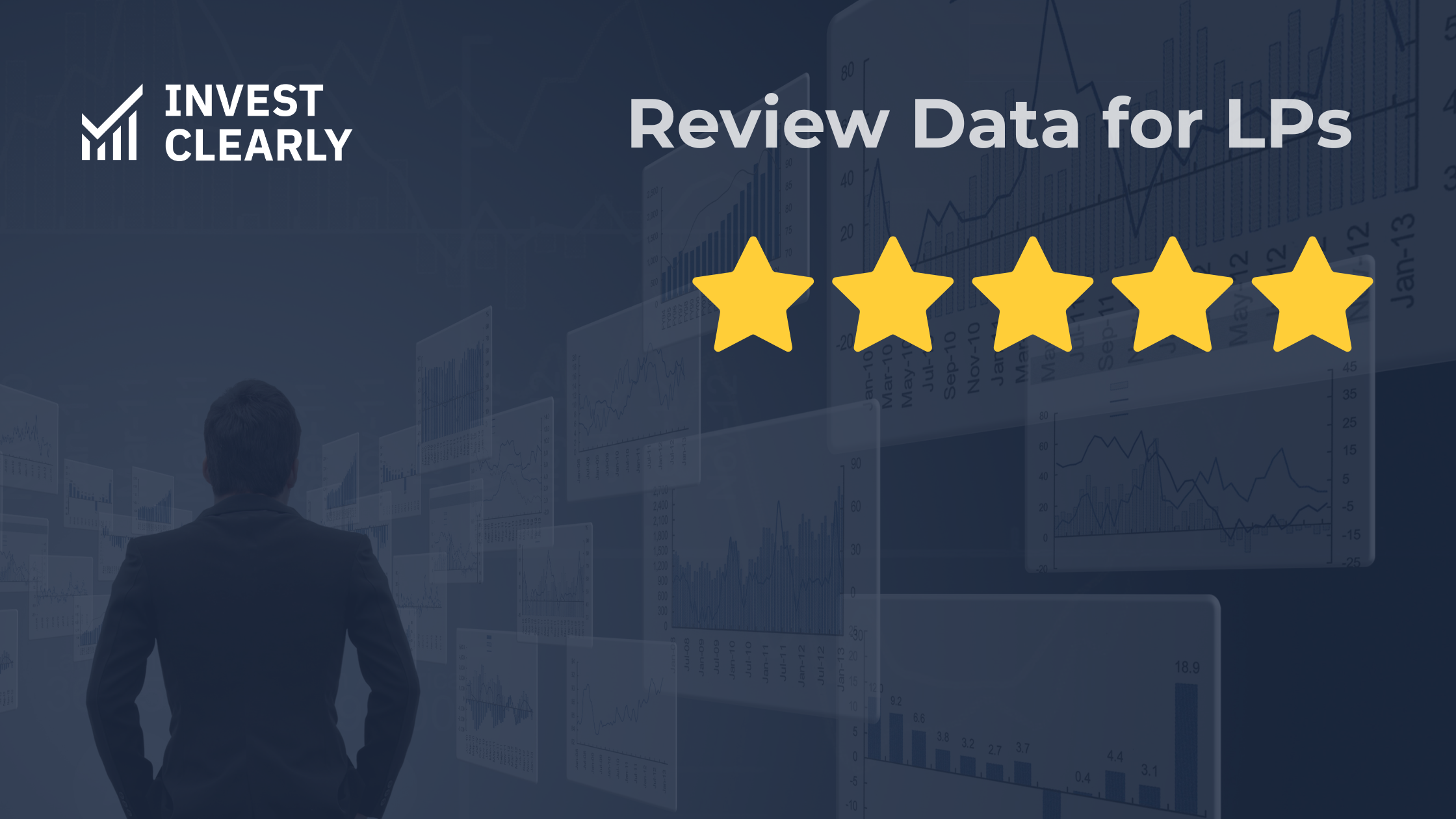
Investor Experience Index Q3, 2025: LP Takeaways
Discover quarterly insights of how LPs rate their experiences with GPs. Get data-driven questions to use when evaluating GPs.
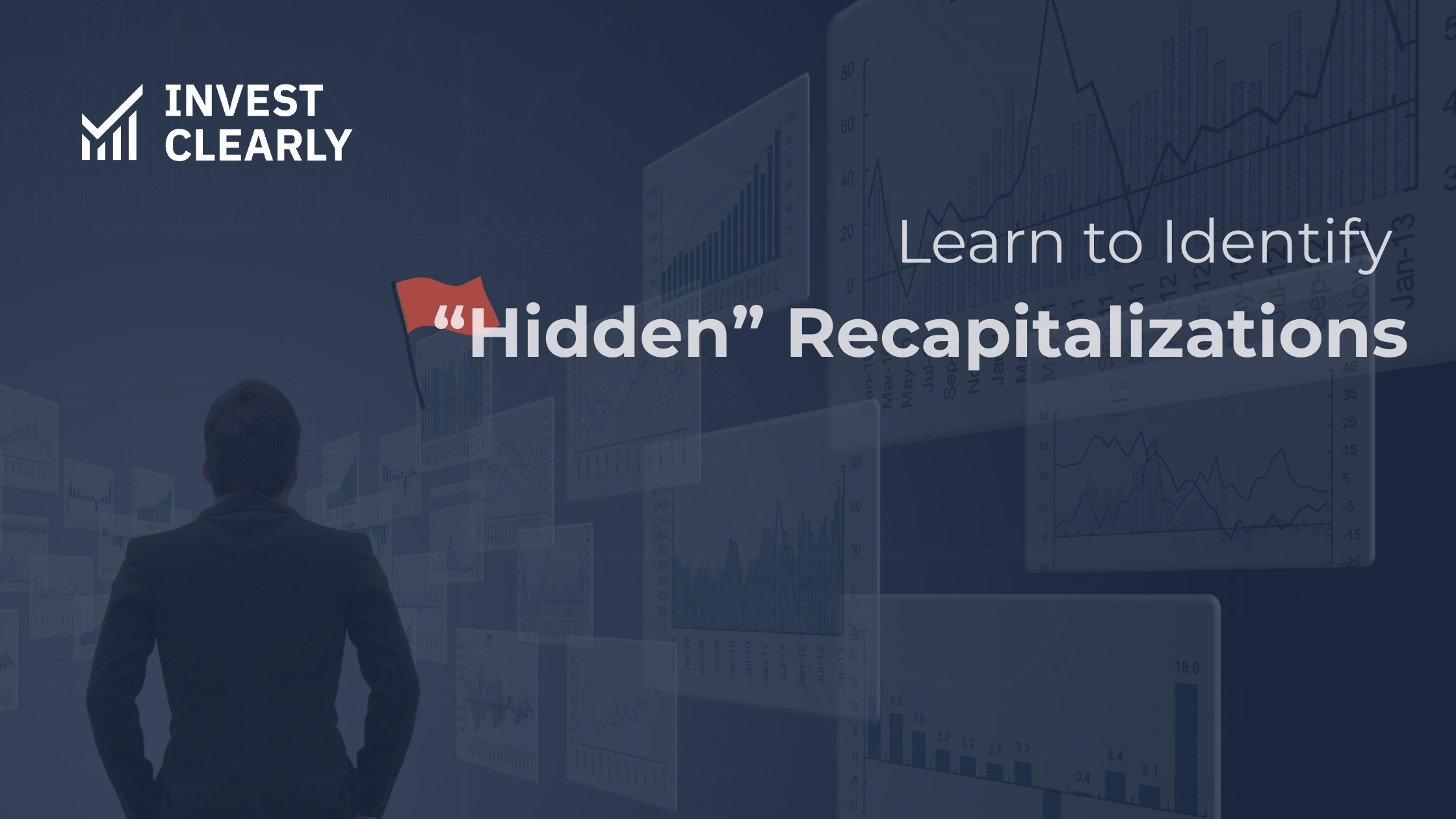
Real Estate Recapitalizations—What Passive Investors Need to Know
A recapitalization is a restructuring of a property's capital stack (the mix of debt and equity that finances an investment). While they can be legitimate business strategies, transparency can be an issue.
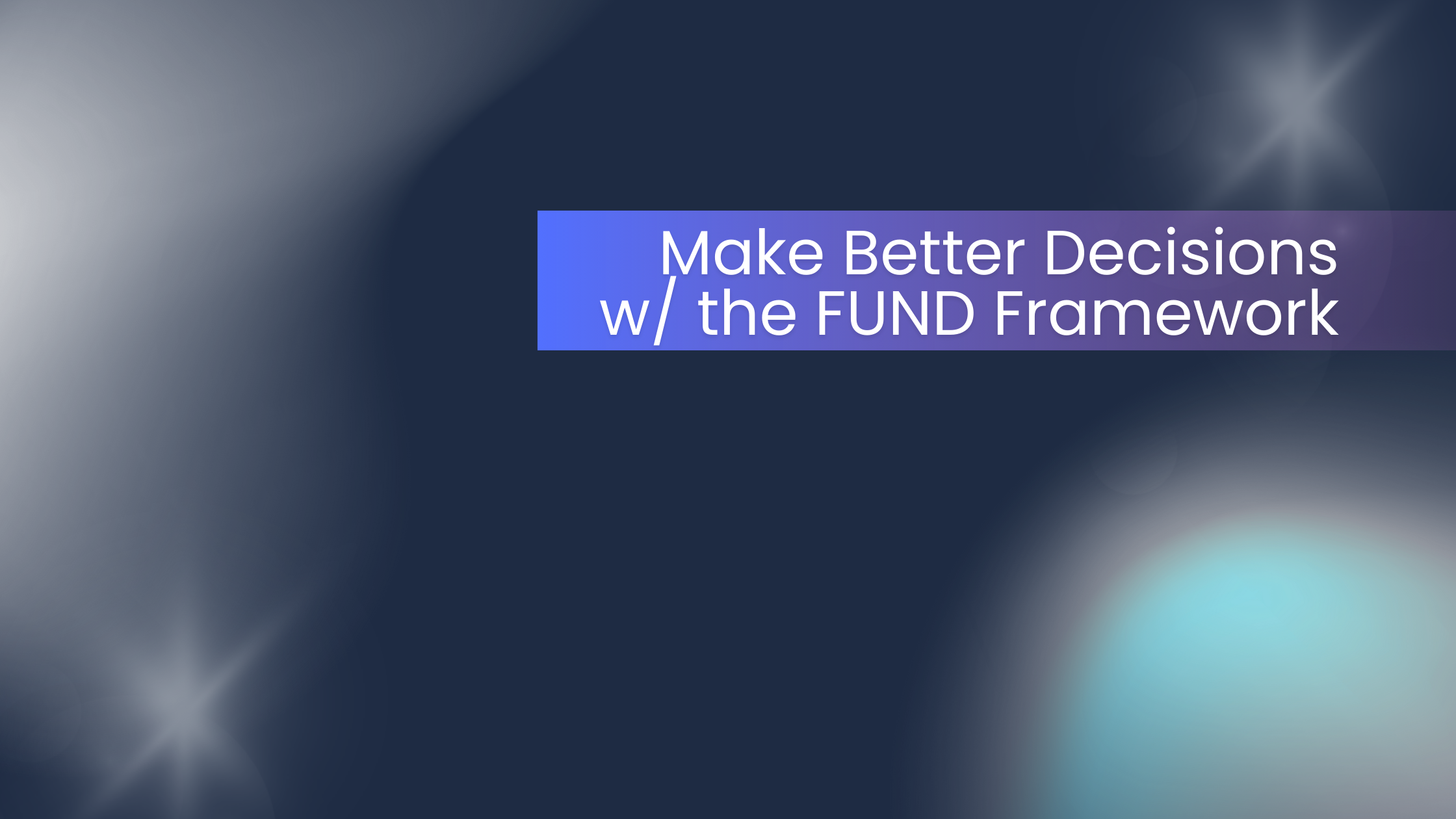
How to Evaluate a Potential Investment Using the FUND Framework
The FUND framework is a simple way to evaluate opportunities by looking at four pillars: Financials, Underlying Assets, Notable Differentiator, and Delegation of Responsibilities.
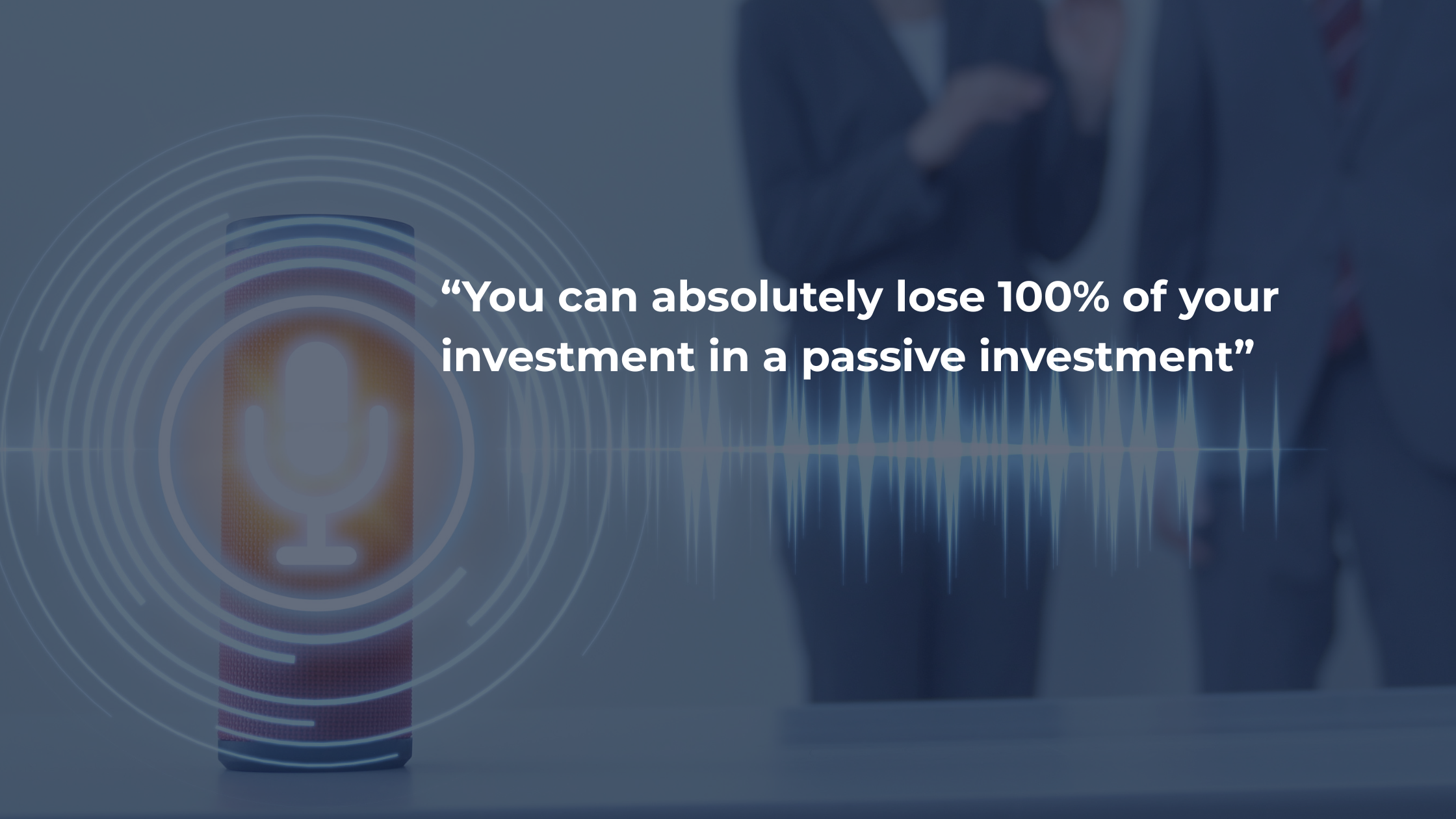
What Needs to “Die” in Passive Investing – According to Guests of The Invest Clearly Podcast
Get the answer to the closeout questions of each podcast episode: “What do you think needs to die in passive investing?” The answers are wide-ranging, from misconceptions about risk, to misleading marketing tactics, to structural issues in how deals are presented.
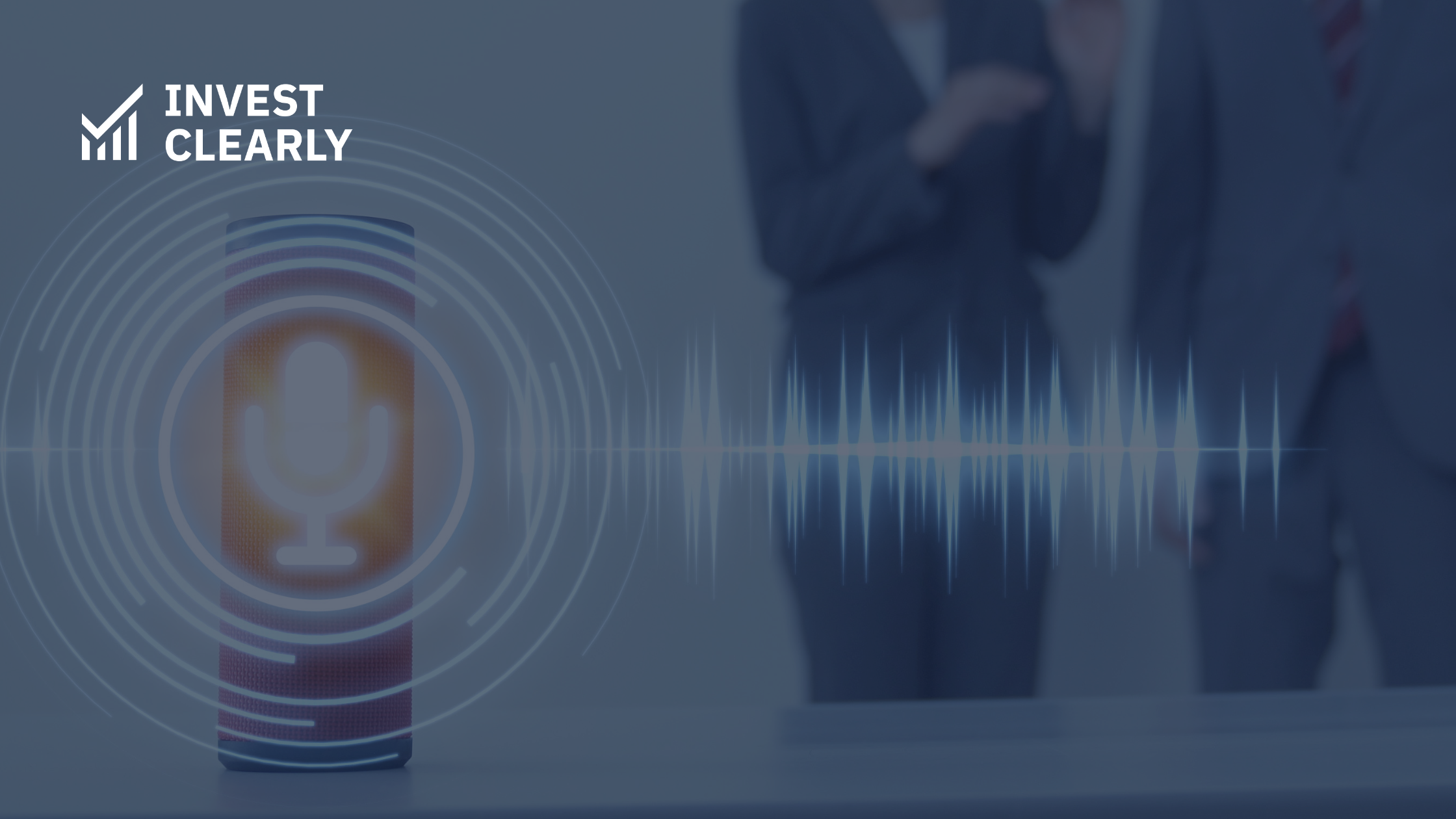
Passive Real Estate Investing Advice from Experienced LP Investors
Experienced LPs shared their most valuable lessons, drawn from years of investing across various asset classes and sponsor relationships.
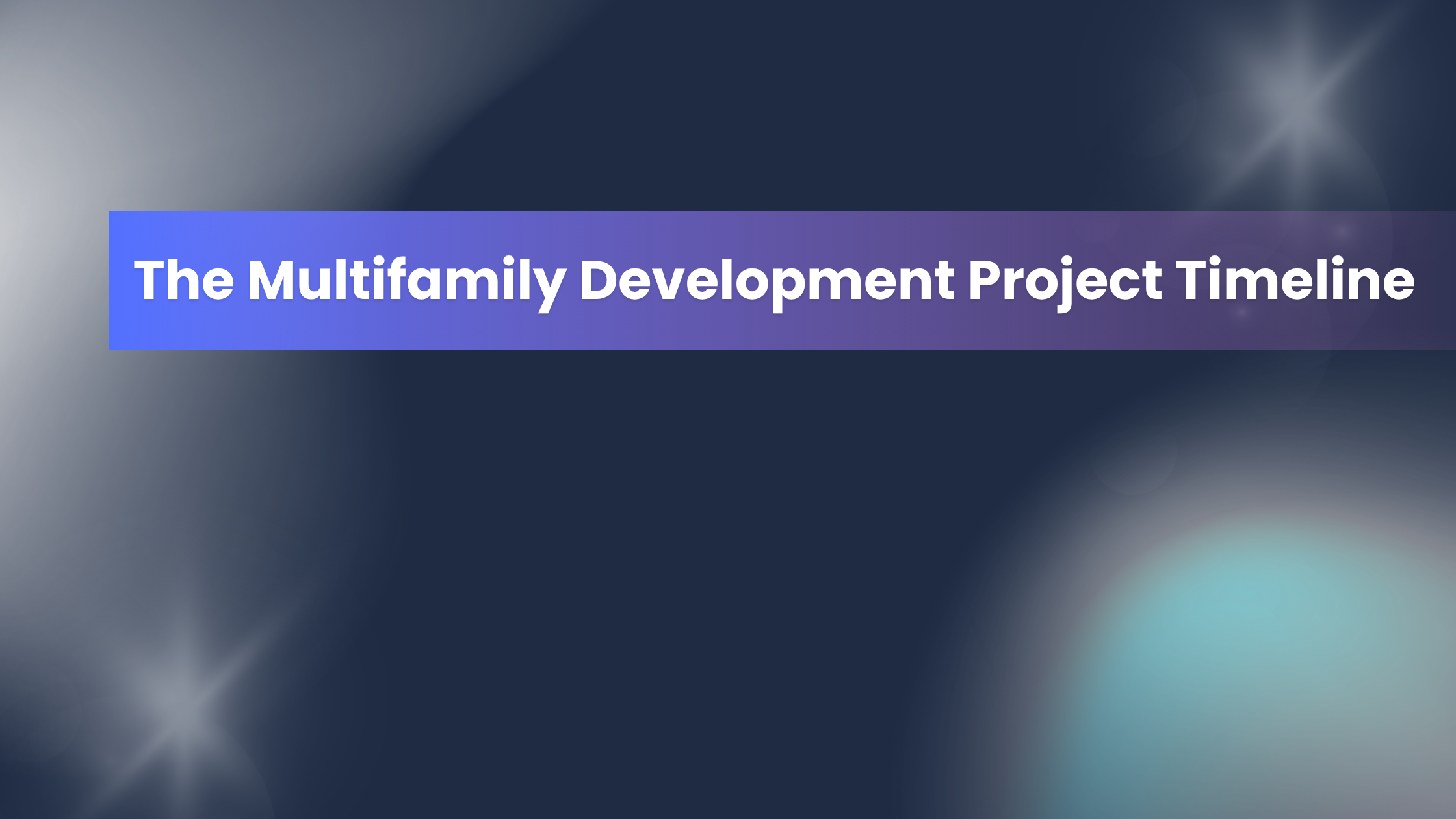
From Land to Lease-Up: The Lifecycle of a Multifamily Development Deal for LPs
This guide walks you through the typical timeline of a multifamily development project from the LP perspective. Learn when investors come on board, what happens during construction and lease-up, and how profits are realized at exit.